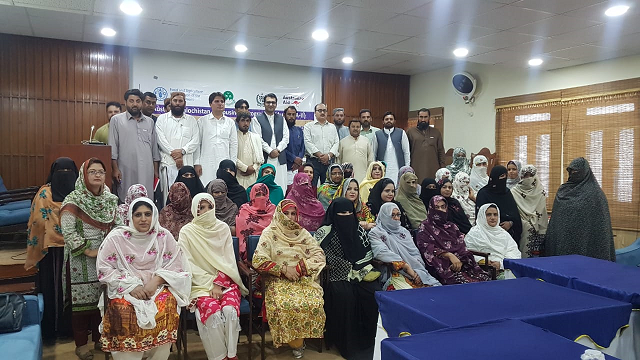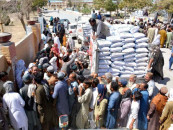FAO, UNHCR provide earning opportunities to Afghan refugees
40 men, women receive training on vegetable production

The participants of a training session on Integrated Homestead Gardening. PHOTO: FILE
This collaboration will enable refugees to establish kitchen gardens which will provide them opportunities to engage in economic activities and eventually improve food security and nutrition for their families.
E-agriculture strategy discussed
Highlighting the importance of this collaboration, Minà Dowlatchahi said, “FAO looks forward to working with UNHCR for contributing to efforts aimed at improving food security and nutrition and stimulating income generation for the refugees and their families. As part of One UN family in Pakistan, we stand determined to play our role in making a difference in the lives of vulnerable communities through this collaboration with the UNHCR.”
UNHCR High Commissioner for Refugees Filippo Grandi appreciated the collaboration between UNHCR and FAO to help build sustainable livelihoods for Afghan refugees.
FAO will advise UNHCR on enabling afghan refugees to establish kitchen gardens in the districts, including the provision of tools, seed, irrigation kits and other essential inputs.
Improving livelihoods: Afghan refugees receive skill training certificates
FAO will also link UNHCR beneficiaries with the trained government facilitators in the district. Training on enterprise and agri business development for UNHCR districts will also be conducted.
UNHRC Head of Mission in Balochistan Marin Din Kajdomcaj said that this was just the beginning of the cooperation between FAO and UNHCR and that organisations were obliged to jointly mobilise funds for follow-up activities for Afghan refugees in the districts.
He emphasised that the skills learnt during this training would not only be utilised by refugees in Pakistan but would also be helpful in restoring their livelihoods upon return to their homes.
In this connection, FAO in collaboration with UNHCR also organised five days training on integrated homestead gardening at the FAO model vegetable kitchen garden in the Balochistan Agricultural Research and Development Centre (BARDC), Quetta.
FAO, Haji Sons introduce modern vegetable seedling production
Forty men and women from FAO, district community facilitators, government of Balochistan and UNHCR staff and their implementing partner in Chagai were trained on various aspects of vegetable production, including seed selection and production; seed bed preparation; sowing, irrigation, mulching; integrated pest and diseases management; fertiliser application; nutritional aspects of vegetables and fruits; harvesting and processing as well as the economic aspects of vegetable production.
Within the framework of the Australian government-funded Australia Balochistan Agri Business Programme, FAO established vegetable kitchen gardens in six districts in South West Balochistan. Fruits and vegetables are produced, poultry and goats are raised and honey is also produced on a small scale at these kitchen gardens.
Adopting a Farmer Field School approach on the establishment and operation of these gardens, FAO equipped women with knowledge and skills to maintain their own gardens back home in their districts.
Integrated Homestead Gardening is instrumental in increasing rural production and consumption of vegetables and fruits and to enhance the nutritional status of mothers and children in the villages. A marketable surplus as a result of these activities helps generate income for women.



















COMMENTS
Comments are moderated and generally will be posted if they are on-topic and not abusive.
For more information, please see our Comments FAQ